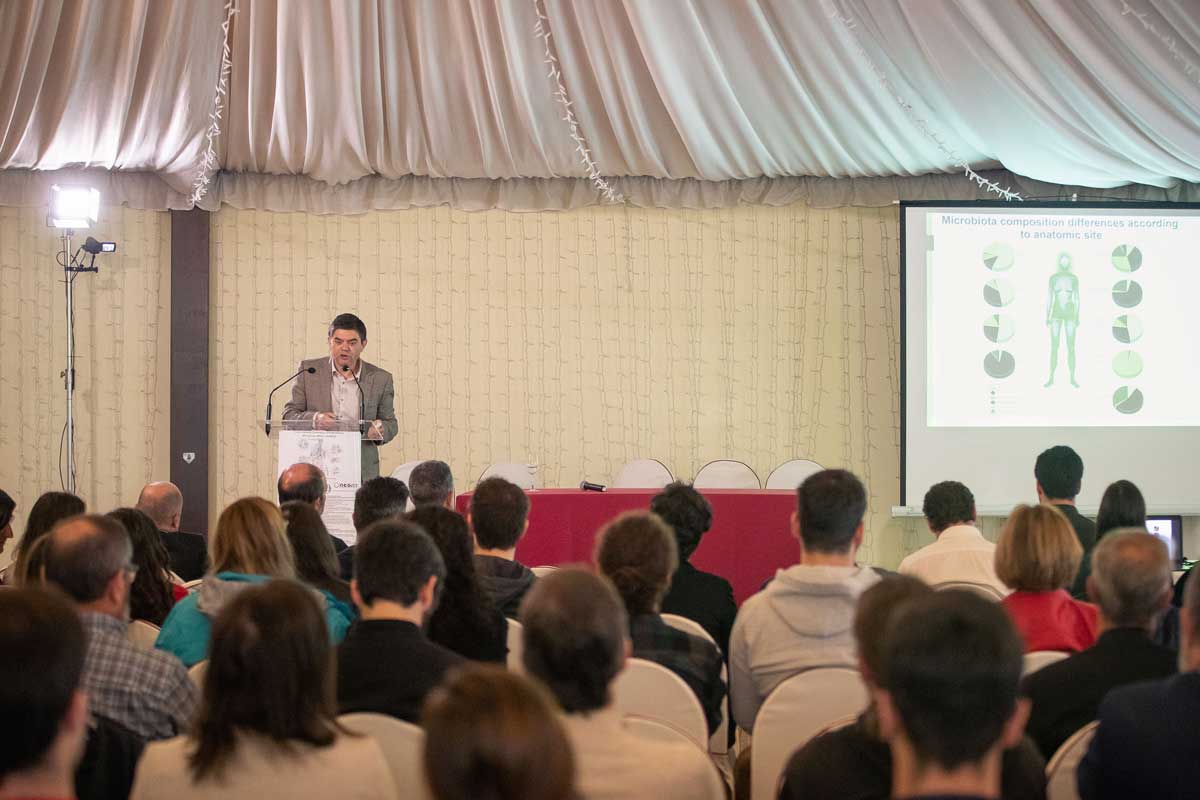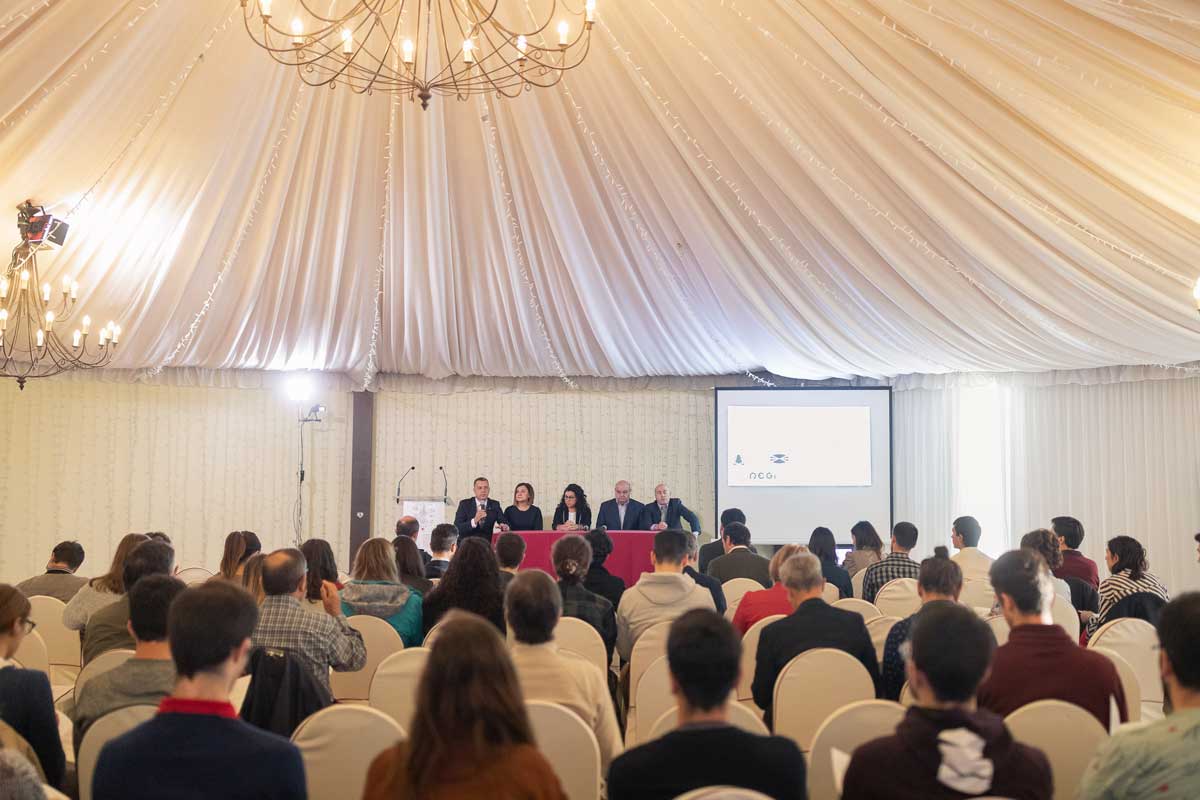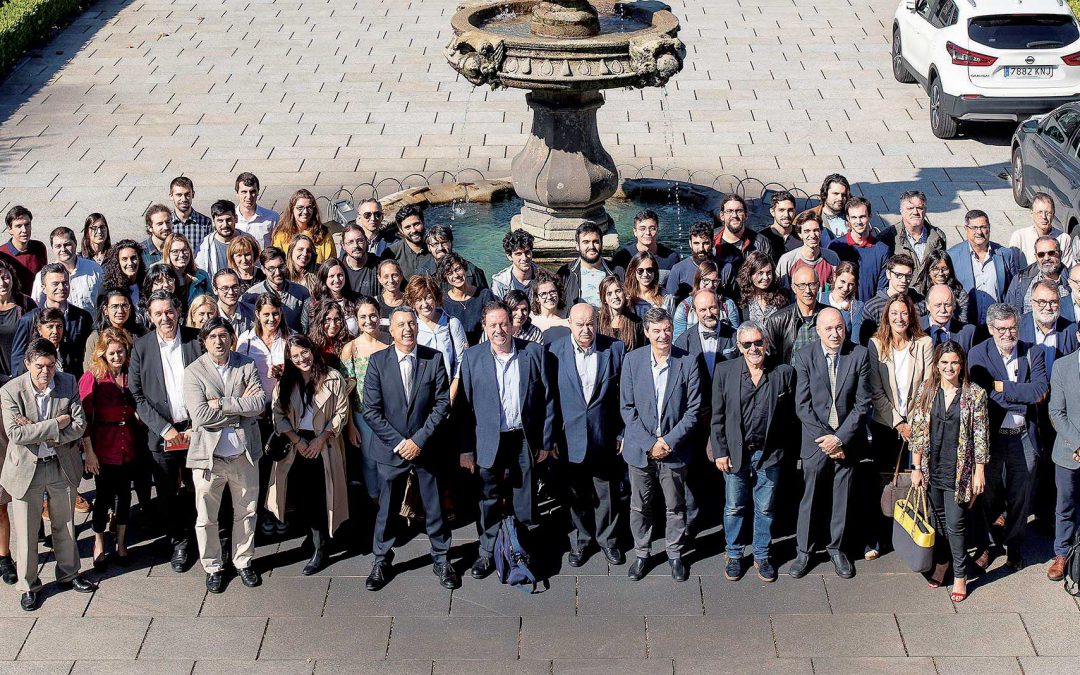Medical and technological specialists, under the coordination of Alejandro Pazos, Principal Investigator of Regicc and the Rnasa-Imedir group, presented the latest scientific advancements.
JOSÉ M. VERDURA PADRÓN
The crucial importance of the microbiota—those over a hundred trillion microorganisms that inhabit the human body—in fundamental health processes was analyzed yesterday by dozens of experts in biomedicine and computer science. They did so at the first Conference on Microbiota held at the Pazo de Lestrove in Padrón, organized by a group involving three universities and the Galician Health Service.
The conference was a success, with a dense and engaging program that examined the impact of microbiota on humans from multiple perspectives. The design of the event was handled by the scientific committee, which included Dr. Benito Regueiro, Dr. Jose Luis Ulla, Alejandro Pazos—Principal Investigator of Regicc and the Rnasa-Imedir group, who also acted as coordinator and speaker for the event—Dr. José Manuel Vázquez, Dr. Francisco Blanco, Dr. Javier Maestro, and Dr. Humberto González. They were assisted in organizing the event by Dr. Ana Porto, Cristian Munteanu, Francisco Cedrón, Jesús Fraiz, Aliuska Duardo, as well as José Liñares and Candela Rodríguez.
The microbiota is present inside and on the skin of humans. It is distributed in diverse areas, including the digestive tract, respiratory and urinary systems, skin, tear ducts, and the oral-pharyngeal cavity. However, its activity can also affect the circulatory system, as outlined in the brief talks and presentations given by the conference speakers.
These talks explored the relationship between these tiny organisms and various aspects of human health. Speakers noted that international research has shown that microbiota composition is specific and individualized for each person, forming a diverse population of various families of viruses, bacteria, fungi, archaea, and even protozoa and other species.
Studies also suggest that these microorganisms may have evolved alongside humans and have helped shape us into what we are today. It is likely that they will continue to accompany us in the future.
However, the most important takeaway from the scientific conferences held yesterday is the positive and negative roles that the so-called microbiota plays in human health. While a good diet supports a healthy gut flora that benefits human health, specialists also revealed that some microbiota components have been implicated in a wide range of systemic diseases in recent years.
Therefore, the message from the doctors, scientists, and technologists gathered in Padrón is to raise awareness about the need for further research on this crucial topic. The hope is that the overview presented yesterday at this pioneering and multidisciplinary meeting on the microbiota will inspire future research actions, leading to new care protocols and improving the quality of healthcare, thus enhancing the sustainability of the public health system.

Diet is Essential for Gut Flora that Prevents Heart Disease
GUILLERMO ALDAMA
The cardiology specialist from Chuac discussed the cardiac relationship with the microbiota in his talk, “Making a Heart Out of Guts.” He noted that despite advances and discoveries in cardiology, we are still unable to accurately predict the risk of cardiovascular disease in some individuals.
In his presentation, he highlighted that it has recently been shown that the collection of microorganisms residing primarily in our intestines, known as the microbiota, plays a fundamental role in our health. He related this to lifestyle, emphasizing that diet influences the type of microbiota we have, and this microbiota processes food differently depending on its composition.
He pointed out that some of these bacteria are beneficial for cardiovascular health, while others produce substances that increase the risk of heart disease and death from cardiovascular conditions. This is true regardless of whether the person has hypertension, diabetes, or high cholesterol. We know that the presence of different types of bacteria depends on diet, and healthy dietary patterns promote the development of a healthy flora.

In-Depth Analysis by Speakers from Multiple Perspectives
The Connection Between Microorganisms and Diseases is Well Established
BENITO REGUEIRO
The Chair of Microbiology at USC and Head of Service at Hospital Álvaro Cunqueiro introduced the general topic of the conference. He discussed the overall role of the microbiota, which, in symbiosis with the human genome, constitutes the genetic information resources (hologenome). He also provided examples demonstrating its evolutionary significance and how our biological knowledge has generated databases as large as those developed by physicists. He emphasized the need to use artificial intelligence on platforms to organize this knowledge.
FRANCISCO BLANCO
The Scientific Director of the Biomedical Research Institute of A Coruña presented the role of the microbiota in rheumatic diseases. He explained that gingival infection (periodontitis) is one of the causes of rheumatoid arthritis and noted that smoking influences gingivitis, increasing the risk of developing the disease in smokers.
ÓSCAR CORDERO
The Professor of Biochemistry and Molecular Biology at USC discussed how oral hygiene could protect against cancer. He reported that epidemiological studies are beginning to confirm the link between these bacteria and cancer. He suggested that the mechanism might be related to these bacteria forming biofilms and participating in metastasis, highlighting the importance of oral hygiene.
JAVIER CASTRO
The Head of the Digestive System Service at CHU de Ferrol spoke about the relationship between chronic inflammatory bowel diseases and the gut microbiota. He noted that current research is analyzing available evidence to establish links between microbiota alterations (dysbiosis) and the significant increase in incidence of these conditions in developed populations worldwide.
VÍCTOR MAOJO
The Professor of Computing and Artificial Intelligence at the Polytechnic University of Madrid discussed how analyzing data from large populations (both patients and healthy individuals) could reveal associations between diseases and various components of the microbiota. He noted that extensive use of artificial intelligence techniques already helps recognize patterns and extract knowledge, leading to new classifications and discoveries of characteristics associated with microbiota-related diseases. Text mining also helps uncover hidden knowledge in scientific articles and clinical documents.
CRISTIAN MUNTEANU
The Professor of Computer Science at UDC presented examples of computational models using artificial intelligence techniques. He indicated that the perfect blend of these techniques offers a solution to the complex problem of microbiota and its relationship with the human body by integrating molecular, epigenetic, metabolic, systemic, clinical information, diet, and multiple external exposure factors.
ALFONSO SOLAR
The Head of the Pediatric Gastroenterology Unit at Chuac highlighted that inflammatory bowel disease has tripled its incidence in the Spanish pediatric population over the last 25 years. He noted increasing evidence of the importance of changes in gut flora (dysbiosis) in the onset of these diseases and hopes that advancements in biotechnology will provide better understanding of gut flora composition (bacteria, fungi, and viruses), leading to promising developments in diagnosis, progression, and treatment.
LUIS LEÓN AND PAULA PELETEIRO
The doctors from the Medical Oncology and Radiotherapy Services at CHUS reviewed pancreatic cancer, discussing the factors related to its development with a particular focus on the potential role of the microbiota and its impact on responses to treatments for advanced or metastatic pancreatic cancer.
GUILLERMO VÁZQUEZ
The Deputy Director of Information Systems at the Integrated Management of A Coruña detailed the ICT resources of Sergas, covering hardware infrastructure, available databases, and briefly described the Hexin project, the Big Data initiative of the Galician Health Service, which will be a key resource for research projects.
JOSÉ LUIS ULLA
The specialist in digestive diseases at CHU de Pontevedra analyzed the connection with colorectal cancer. He indicated that up to 20% of this disease can be traced back to infection by various types of microbes, noted that technological advances allow rapid typing of microbial composition, and that colorectal cancer patients show a characteristic composition.
RAFAEL ALONSO
The Head of the Home Dialysis Unit at CHUS explained that in patients with chronic kidney disease, alterations in gut microbiota are common due to uremia, uric acid accumulation, inadequate fiber intake, and multiple medications. This alteration is associated with increased toxins from the intestinal metabolism of microorganisms that cannot be eliminated due to kidney damage.
GERMÁN BOU
The Head of the Microbiology Service at Chuac emphasized the importance of maintaining healthy gut microbiota for overall well-being. He advocated for promoting factors that support a healthy lifestyle: exercise, reducing stress, quitting smoking, and particularly a rich, varied, healthy diet with a high component of vegetables and fruits to support a diverse gut flora.
MAR CASTELLANOS
The Head of the Neurology Service at Chuac explained that there is bidirectional communication between the gut and the brain that modulates the functioning of both. She noted that aging leads to changes in the composition of the gut microbiota, which can contribute to deteriorating health and the onset of neurodegenerative diseases such as Parkinson’s and Alzheimer’s.
ALBERTO CEPEDA
The Chair of Nutrition and Bromatology at USC explained that the interaction between microbiome and diet provides essential functions in human physiology, including metabolism, immunity, and neuronal health. He stated that diet is a determining factor and will soon be a key element in improving health based on dietary type.
JOSÉ LIÑARES
The bioinformatics expert participated in the workshop on artificial intelligence applied to metagenomic data and provided a new approach to analyzing microbiome data for knowledge extraction.

